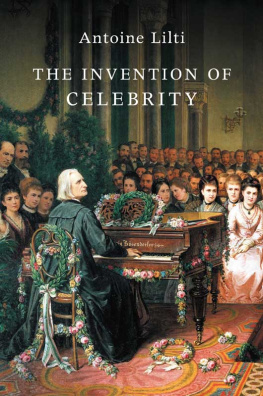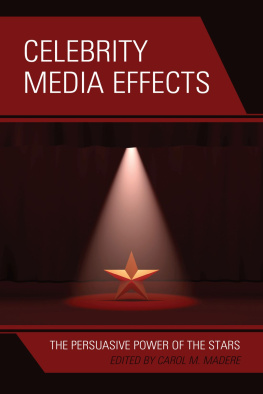The Psychology of Celebrity
Why are we fascinated by celebrities weve never met? What is the difference between fame and celebrity? How has social media enabled a new wave of celebrities?
The Psychology of Celebrity explores the origins of celebrity culture, the relationships celebrities have with their fans, how fame can affect celebrities, and what shapes our thinking about celebrities we admire. The book also addresses the way in which the media has been and continues to be an outlet for celebrities, culminating in the role of social media, reality television, and technology in our modern society.
Drawing on research featuring real-life celebrities from the Kardashians to Michael Jackson, The Psychology of Celebrity shows us that celebrity influence can have both positive and negative outcomes and the impact these can have on our lives.
Gayle Stever is an associate professor for SUNY/Empire State College, an institution that is focused on goals of lifelong learning, adult education, and access to higher education for all. She earned her Ph.D. in developmental psychology with an emphasis in the psychology of media from Arizona State University in 1994. She has spent the last 30 years studying fan/celebrity relationships from a participant observer perspective and to that end, has networked extensively into a number of fan groups of both pop stars like Michael Jackson, Madonna, or Josh Groban and also television stars like William Shatner, Rene Auberjonois or Alexander Siddig.
THE Psychology of Everything Series
The Psychology of Everything is a series of books that debunk the myths and pseudo-science surrounding some of lifes biggest questions.
The series explores the hidden psychological factors that drive us, from our sub-conscious desires and aversions, to the innate social instincts handed to us across the generations. Accessible, informative, and always intriguing, each book is written by an expert in the field, examining how research-based knowledge compares with popular wisdom and illustrating the potential of psychology to enrich our understanding of humanity and modern life.
Applying a psychological lens to an array of topics and contemporary concerns from sex to addiction to conspiracy theories The Psychology of Everything will make you look at everything in a new way.
Titles in the series
The Psychology of Grief
Richard Gross
The Psychology of Sex
Meg-John Barker
The Psychology of Dieting
Jane Ogden
The Psychology of Performance
Stewart T. Cotterill
The Psychology of Trust
Ken J. Rotenberg
The Psychology of Working Life
Toon Taris
The Psychology of Conspiracy Theories
Jan-Willem van Prooijen
The Psychology of Addiction
Jenny Svanberg
The Psychology of Fashion
Carolyn Mair
The Psychology of Gardening
Harriet Gross
The Psychology of Gender
Gary W. Wood
The Psychology of Climate Change
Geoffrey Beattie
The Psychology of Vampires
David Cohen
The Psychology of Chess
Fernand Gobet
The Psychology of Music
Susan Hallam
The Psychology of Weather
Trevor Harley
The Psychology of Driving
Graham J. Hole
The Psychology of Retirement
Doreen Rosenthal and Susan M. Moore
The Psychology of School Bullying
Peter Smith
The Psychology of Celebrity
Gayle Stever
For further information about this series please visit
www.thepsychologyofeverything.co.uk.
The Psychology
of Celebrity
Gayle Stever

First published 2019
by Routledge
2 Park Square, Milton Park, Abingdon, Oxon OX14 4RN
and by Routledge
711 Third Avenue, New York, NY 10017
Routledge is an imprint of the Taylor & Francis Group, an informa business
2019 Gayle Stever
The right of Gayle Stever to be identified as authors of this work has been asserted by them in accordance with sections 77 and 78 of the Copyright, Designs and Patents Act 1988.
All rights reserved. No part of this book may be reprinted or reproduced or utilised in any form or by any electronic, mechanical, or other means, now known or hereafter invented, including photocopying and recording, or in any information storage or retrieval system, without permission in writing from the publishers.
Trademark notice: Product or corporate names may be trademarks or registered trademarks, and are used only for identification and explanation without intent to infringe.
British Library Cataloguing-in-Publication Data
A catalogue record for this book is available from the British Library
Library of Congress Cataloging-in-Publication Data
A catalog record for this title has been requested
ISBN: 978-0-815-36955-4
ISBN: 978-0-815-36956-1
ISBN: 978-1-351-25210-2
Typeset in Joanna
by Apex CoVantage, LLC
Contents
Writing this book has been a journey for me. While I have developed expertise over the years on the subject of celebrities as they relate to their fans, the wider area of celebrity was newer to me. My journey began in 1988 with my masters thesis on Michael Jackson fans. In the intervening years, I have done further participant observer studies in the fandoms of Star Trek: Deep Space Nine and Star Trek in general, Madonna, Bruce Springsteen, Prince, George Michael, Paul McCartney, Lord of the Rings, and other media fandoms. I spent 2005 to the present on the fans of Josh Groban, who have been gracious, welcoming, and supportive. They have filled out hundreds of questionnaires, read drafts of papers, and helped in various other ways over the past 13 years. Josh Groban has read and made supportive remarks to me about various papers beginning back in 2006, the very first time I had the privilege of meeting him. My publications over the years are listed in the references at the back of this book and can be accessed at ResearchGate.net.
The purpose of this book is to give a window to the topic of celebrity through the lens of psychology, with an eye to making accessible the rather esoteric literature. This is a fancy way of saying that many other books are written at a postgraduate level, and, as such, are challenging reading. When I make recommendations for further reading throughout this book, I have tried to choose the most accessible sources and not recommend the more difficult ones. While this is a book for the student more than the scholar, I hope that some of the insights I have gained will be useful to any scholars who might happen onto this discussion.
Without the unfailing support of Empire State College/State University of New York and my colleagues there, this book would not have been possible. The college gave me release time to work on it, and my colleagues were interested and supportive throughout the process. I am very grateful for this.
Several of my actor/friends from Deep Space Nine have offered interviews and discussions for this book and those are Rene Auberjonois, Aron Eisenberg, Chase Masterson, Andrew Robinson, Armin Shimerman, and Alexander Siddig. The very presence of such kind and interested celebrities from such a prominent franchise as Star Trek and the depth with which they approached my questions makes a statement, in itself, about the nature of celebrity in todays culture. I am once again very grateful, as I have been in the past when these same people contributed in a major way to my writing and thinking about fan cultures.










